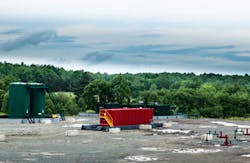Fracking wastewater causes problems for treatment plants, study finds
According to a new study from the University of Pittsburgh, wastewater treatment facilities are not able to remove all the pollutants from the water used in natural gas extraction. Results from the research suggest that there were still increased levels of chemicals present in the water after treatment.
The problem lies in the so-called fracking process, also known as hydraulic fracturing, in which high quantities of water are injected underground at high pressure. The pressure helps break rock formations and facilitates access to natural gas that is not accessible through conventional extraction techniques. In 2012 about a quarter of the entire U.S. natural gas production involved fracking, according to the Chemical and Engineering News website. The vast majority of the water used in the process returns to the surface and is collected as wastewater. In general, companies have three options to deal with it — reuse it, inject it into deep storage wells or send it to a wastewater treatment facility.
In May 2011, the Pennsylvania Department of Environmental Protection (DEP) said that the treatment plants in the state should voluntarily put an end to processing fracking wastewater, after concerns were raised over elevated levels of bromide detected in the Pennsylvania Monongahela River watershed. However, scientists have not managed to find solid evidence that the pollution was caused by fracking waste. Overall, there has been very little research into the impact of fracking wastewater on surrounding habitats or into the quality of the water after being treated in sewage plants.
RELATED: Ohio steps up rules for safer disposal of Utica Shale drilling waste
Kyle J. Ferrar, a graduate student at the University of Pittsburgh and leader of the research, analyzed water leaving Pennsylvania sewage plants, which used to process fracking wastewater but later stopped the activity, as the state's DEP requested. The team of researchers took samples from water used in shale gas extraction from the largest shale gas basin in the United States, the Marcellus Shale. The samples they collected were from both before and after the state called for an end to wastewater processing.
Thanks to a number of different spectroscopic techniques, the researchers measured levels of chemicals that are present in gas production waste but are not usually found in other industrial wastewater. Even though the chemical levels detected in the samples varied significantly between the different treatment plants, in general the concentrations fell dramatically after the plants stopped processing the fracking waste, the study found.
At a municipal plant in Greene County, for instance, the average barium concentrations dropped from 5.99 to 0.14 mg/L. When the plants still handled the waste, the levels of some chemicals present in the water exceeded drinking water standards set by the U.S. Environmental Protection Agency, Ferrar explained.
